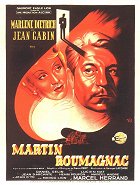Directed by:
Georges LacombeScreenplay:
Pierre VéryCinematography:
Roger HubertComposer:
Giovanni FuscoCast:
Marlene Dietrich, Jean Gabin, Jean d'Yd, Daniel Gélin, Jean Darcante, Marcel Pérès, Margo Lion, Marcel Herrand, Marcel André, Marcelle Hainia, Maurice Dorléac (more)Plots(1)
Absent from the screen since 1944's Kismet, the incomparable Marlene Dietrich returned in the French romantic melodrama Martin Roumagnac. La Dietrich is cast opposite Jean Gabin, here playing a small-town contractor with an eye for the ladies. He is entranced by Dietrich, a woman who's "been around" and who intends to remain in circulation even after trapping Gabin in her web. When Gabin figures out he's been had, the results are unexpectedly tragic. Martin Roumagnac was a second-choice project for Dietrich and Gabin, who'd originally been offered the leads in Marcel Carne's Les Portes de la Nuit. (official distributor synopsis)
(more)Reviews (1)
The Room Upstairs is one of those films that much has been written and thought about. It is atypical because it is the only French film of Marlene Dietrich. It also features the post-war return of Jean Gabin. Dietrich and Gabin met during the war in the Hollywood French Colony. Dietrich had already made an American film with René Clair in the early 1940s and had seen France as her dream home all her life. She could not live in Germany after 1930, and she had the peak of her career in the USA, but she decided to live the end of her life in France. As a teenager, she loved her French teacher and sang many great songs in French. So why the discontent accompanying The Room Upstairs? The global reason is simple. The film did not receive wider distribution in the US under the title The Room Upstairs until 1948, after Dietrich's American comeback in Golden Earrings. The copy was half an hour shorter due to the Catholic Legion of Decency's outrage, and local audiences weren't interested in watching their old German star as an Australian femme fatale seducing a bricklayer in the French countryside. Yet we can rise above such banalities, and regret that we don't have a translation of Pierre-René Wolfe's original 1935 novel. Connoisseurs of Marlene Dietrich's career, on the other hand, hold the film in high esteem, ranking it alongside such wonderful experiences as 1930s Desire and 1950s Monte Carlo, because the formula of all these films is strikingly similar, yet each has its own original approach. Marlene Dietrich, as a supremely attractive woman with a secret, is the ideal partner for life.
()

